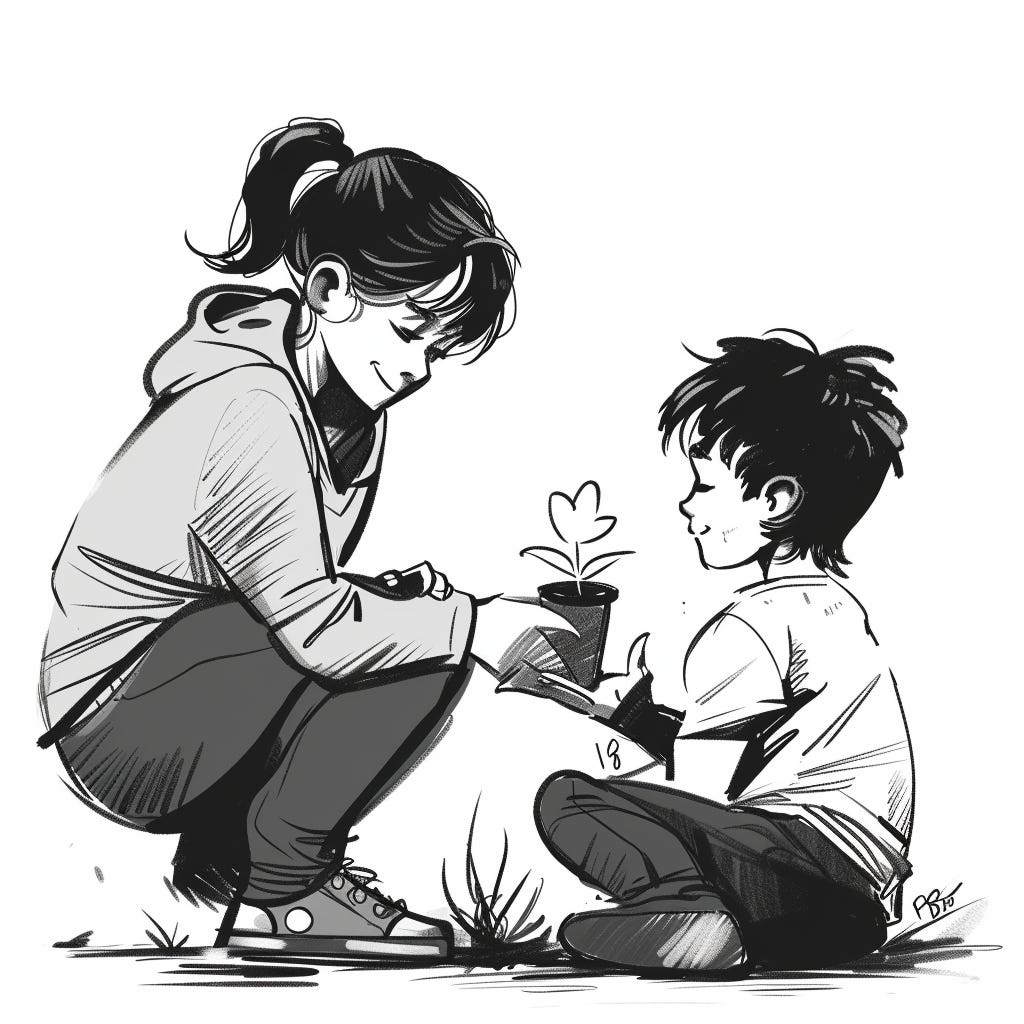I’m in New Zealand, and tried to run a half-marathon yesterday. I tore my calf 1.5km in. I injured myself so quickly I could still see the start line, so at least didn’t have to get an embarrassing ride back from deep in the forest - just endure the pitying look of the fit grandmas energetically charging past me, pumping their hiking sticks. One local dad leaned out of the car and shouted “You’re going the wrong way bro!” while his kids giggled. “Tore my calf!” I said back, trying to balance sincere regret with a jovial, nonchalant air. “Oh noooo000oo00 brooooo,” he howled gleefully before speeding off. Tikitapu at Rotorua is very beautiful up close. I recommend slowly limping around it anyday.
Because I’m on holiday, enjoy this repost from earlier last year. Look forward to an essay about why the humanities is the big winner from the AI revolution next week. This week - don’t save the world. Just help one person. It’ll make you happy.
Net Net
Elon Musk is, delicately put, a tad divisive. Whatever the reality of the man, it’s lost in a sea of stories and speculation that try to describe such a consequential guy as a hero or villain. Whether it’s because he comes from apartheid-era wealth, single-handedly revved the electric vehicle revolution, dog-whistles for Nazis or is saving free speech is almost besides the point depending on what you love or hate about the world. The truth is messy, because we’re measuring the moral worth of a complicated life. “I would say on net, he’s been good for society,” said Scott Galloway, “the problem is in that word ‘net’.”
We spend a great deal of our lives trying to align our actions with a story of goodness. Even when we misstep, or even do something evil, there’s a sense that our lives can still be redeemed, a ‘net’ good for the world. Despite my mistakes and ways that I’ve disappointed others I want the footprint of my life to be a positive one, but this is a hard thing to evaluate. For example, I donate 10% of my income to charities vetted as extra-effective at saving lives or reducing misery, but it’s hardly guaranteed to work. As we saw with the downfall of Sam Bankman-Fried, utilitarian calculations about maximising expected value tend to have a dehumanising quality, never fully capturing reality’s inherent mushiness. Still, I think on balance my donations are a net benefit. I’m still moved by Peter Singer’s drowning child thought experiment.
Poetry, Please
Following the implosion of FTX, economist Tyler Cowan mused that perhaps finance and economic types could use more humanities (a comment this English major applauds). He meant that problems inevitably arise when we set out to change the world with big ideas; that the world is complicated, and it is hard to help people. Global ‘interventions’ become geopolitical calamities, well-meaning aid sets communities back decades, and individuals like Elon - despite best intentions and worldly success - frequently underestimate how hard doing good really can be. A word of warning, then, for ambitious wealth-seekers with big ideas about how to improve the world. The world will stubbornly resist and confound you.
It’s entirely possible that Elon is a ‘net’ good for society, but he’s also done some pretty horrible things. It’s entirely possible that in the existential froth of Elon’s actions he’s caused invisible suffering outweighing all his business successes, or some disaster may yet emerge from a wayward tweet. So the caution when we do good from afar is to pay attention to how much skin in the game we have. Our proximity to the problem is a good indicator of how well we understand it, how immersed in the mush we truly are, and how well we might solve it.
That’s why I prefer to volunteer for less efficient but more feel-good activities, rather than throw money at a problem. Aside from being a balm for your mental health, big, ambiguous problems have the additional characteristic of rendering us helpless. We’re so small compared to the immensity of suffering in the world, and making contact with people we can actually help is a crucial reminder of our power and agency.
Hoysted Goes Volunteering
A few weeks ago, I volunteered to unpack Amazon pallets to scour for food, which would then be packaged into meals for the hungry. Compared to, say, saving a life (which costs about $7,000AUD worth of donations, by the way), the 5 hours or so I spent doing this is borderline murder from a utilitarian standpoint. But there was a concrete link between my action and its consequences. Every pallet of food I extracted was unambiguously going to feed someone, just as giving your friend a lift to the airport unambiguously helps them save time and money. When we help those directly around us without middlemen or the abstracting tendencies of money, we strengthen the chain between our intentions and the outcomes they produce. Maybe Elon should volunteer for a soup kitchen shift.
This is a pragmatic approach to doing good in the world. The vast misery and crisis of the modern world is mainlined directly into our brains every day, abstractions so large and looming that a fatalistic avoidance can feel like the only appropriate response. The antidote is to be the good samaritan in the reality you actually occupy, with actual people who live and breathe around you. Take away war, famine, political instability and climate change and your best friends, family and community will still be struggling to live healthier, happier, more connected lives.
This is the real opportunity; to make the life of someone else a bit better, today, even right now. You can do something kind and generous, right now, in a way that will delight and surprise them, and you even know what that thing is! Buck our normal tendency to withhold kindness out of fear of rejection or inconveniencing. If we feel motivated to say something nice out of compassion and love, resist the impulse to ball up into yourself. Say it out loud.
Because that’s the thing about numbers and ideas and information; they take us out of the present, and turn problems into equations to be solved. There’s room for that. I still recommend donating some of your money toward effective charities. We do need to research reality and learn what we can about it. But your life isn’t in information or distant lands. It’s right here, right now. Your happiness, or lack of it, is predicted more by the quality of your relationships than airy notions of doing good.
It lies in the mess and murk of people.

















Share this post